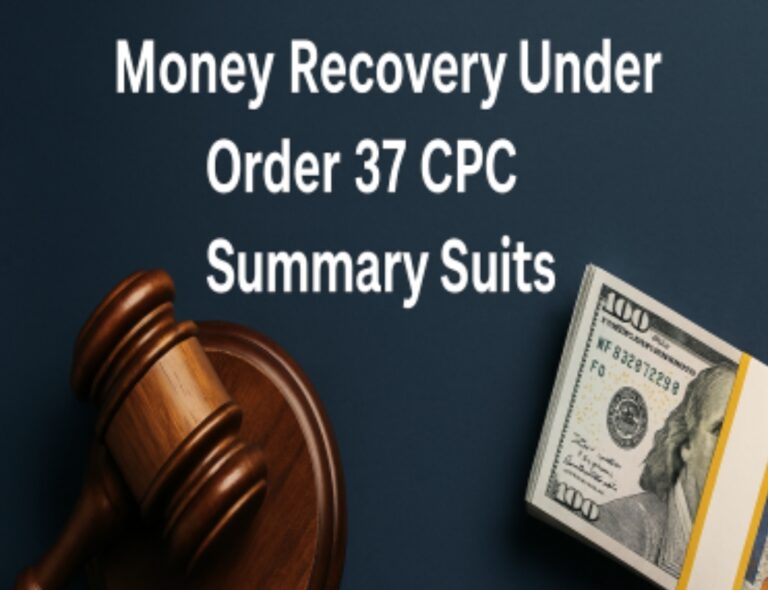Introduction to Summary Suits under Order 37 CPC
Summary suits, governed by Order XXXVII of the Code of Civil Procedure (CPC), provide a fast-track litigation mechanism for cases involving liquidated demands, promissory notes, bills of exchange, and written contracts. This procedure helps plaintiffs secure judgments swiftly without undergoing a full-fledged trial, provided procedural formalities are properly followed.
Types of Jurisdiction in Summary Suits
To file a summary suit effectively, it is critical to understand the three main types of jurisdiction:
1. Subject Matter Jurisdiction
This is non-negotiable and cannot be waived. It refers to a court’s competence to hear specific types of cases. For summary suits, the subject matter must fall strictly within the parameters outlined in Order 37 CPC.
Case Reference: Store One Retail India vs. TTK Prestige (Delhi HC) clarified the nature of permissible claims under summary suits.
2. Territorial Jurisdiction
This jurisdiction pertains to the geographical area where the cause of action arises. Unlike subject matter jurisdiction, it can be waived by the parties.
Example: In M/s Sharma Kalypso Pvt. Ltd. vs. Goan Hotels & Clubs Pvt. Ltd. (Delhi HC), the court declined jurisdiction and returned the plaint for filing in Goa, where the cause of action occurred.
3. Pecuniary Jurisdiction
Pecuniary jurisdiction is determined by the monetary value of the claim. Similar to territorial jurisdiction, this too can be waived by parties involved.
Example: Store One Retail India vs. TTK Prestige also touched upon the pecuniary limits that must be adhered to.
Notable Case Law Influencing Summary Suit Jurisdiction
- Symon and Co. v. Palmers Stores (1912): Emphasized the need for compliance with procedural rules to invoke summary suit jurisdiction.
- IDBI Trusteeship Services Ltd. vs. Hubtown Ltd. (2017): Supreme Court laid down the principles for granting leave to defend, underlining that the existence of triable issues mandates granting such leave.
- Dhulabhai vs. State of Madhya Pradesh (1969): Asserted that jurisdiction is based on the plaintiff’s allegations, not the final outcome.
- Transport India 3PL vs. Indo Alusys Industries Ltd. and Goyal MG Gases Ltd. vs. Premium International Finance Ltd. reinforced the importance of procedural compliance in summary suits.
- Lords Chloro Alkali Ltd. vs. Bhagwati Salt Company (Rajasthan HC): Recognized that jurisdictional disputes often involve mixed questions of law and fact, necessitating evidence.
Key Legal Takeaways
- Timely Jurisdictional Challenges: Defendants must raise jurisdictional objections at the time of filing for leave to defend, or risk waiving them.
- Strict Procedural Compliance: Plaintiffs must ensure that all requirements under Order 37 are meticulously fulfilled, or the suit may be dismissed or converted into a regular civil suit.
- Presentation of Evidence: Courts may require factual evidence to resolve disputes over jurisdiction, especially where the issues involve both law and fact.
Best Practices and Legal Strategy
- Early Evaluation: Assess the court’s jurisdiction before initiating or defending a summary suit.
- Maintain Proper Documentation: Ensure that all contractual documents, notices, and correspondences are in order.
- Be Prepared to Defend: If challenging jurisdiction, be ready to produce supporting evidence to strengthen your stance.
Conclusion
Jurisdiction in summary suits under Order 37 CPC plays a pivotal role in determining the admissibility and success of a case. Legal practitioners must thoroughly evaluate subject matter, territorial, and pecuniary jurisdiction, along with ensuring compliance with procedural rules, to effectively represent their clients in such time-sensitive matters.
